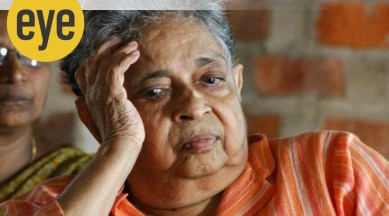Remembering Mary Roy, educator, activist and writer Arundhati Roy’s mother, through her alter ego in The God Of Small Things
The fictional Ammu shared Mary Roy's defiance and feisty spirit, but not her hard-won battles

In her lifetime, Mary Roy achieves all that Ammu, a character drawn from her life in the 1997 novel, The God Of Small Things, cannot. She wins a lawsuit in 1986 that enables Syrian Christian women to inherit property. Ammu, on the other hand, has no “Locusts Stand I”. Mary Roy establishes the Corpus Christi High School (now Pallikoodam) in 1967, in a suburb of Kottayam city in Kerala. Ammu, mother of “two-egg twins” Rahel and Esthappen or Estha, can only mention the possibility of someday running a school, as she stands on a railway platform, bidding goodbye to Estha who is at the barred windows of the Madras Mail. “I’ll be a teacher. I’ll start a school. And you and Rahel will be in it.”
Buy Now | Our best subscription plan now has a special price
Things come to pass, but not favourably for Ammu, who is caught in a fictional universe where she must break the love laws, and die alone in a strange room, at 31, “a viable die-able age”. The passing away of educator, activist and Arundhati Roy’s mother Mary Roy on September 1 this year, is perhaps a fittingly elegiac time to examine the life and transgressions, big and small, of Ammu, nut-brown mother in The God Of Small Things.
Ayemenem, with its pickle factory, treacherous river, old church painted yellow, rice fields and rubber trees is where Ammu must cope with the claustrophobia of her situation. She is a divorcee with fraternal twins, who has returned to the family home, Ayemenem House, where she is constantly reminded of the precariousness of her position as a “wretched Manless woman”. But Ammu glistens with defiance; her observations are often laced with wit; she has deep dimples and a tangerine-shaped transistor with which she sometimes wanders to the edges of the river. In a narrative of bewitching linguistic coinages and registers, Ammu appears, luminous, lonesome, and achingly vulnerable. In 1969, when she is 27 years old and on the way to the airport in a sky-blue Plymouth with her brother Chacko, her spinster aunt Baby Kochamma, and the twins, she “carried the cold knowledge that, for her, life had been lived.” It is this knowledge that lends her an unsettling waywardness, that leads her to love inappropriately, to disrupt Ayemenem’s decorum, its ancient divisions of class and caste. It is this knowledge that brings about her annihilation.
The family in the Plymouth is on the way to Cochin, where they will receive Chacko’s ex-wife Margaret, and her daughter, the twins’ cousin Sophie, who were arriving from London to spend Christmas at Ayemenem. Rahel and Estha have been made to practise an English car song for the drive back from the airport, by Baby Kochamma. They have been schooled to receive Sophie Mol; they will present themselves to her like specimens of anthropological interest. “Must we behave like some damn god-forsaken tribe that’s just been discovered,” Ammu remarks at the Ayemenem House, where the family’s almost blind, widowed, violin-playing matriarch Mammachi, the cook Kochu Maria, and the blue-aproned workers of the Paradise Pickles & Preserves factory have gathered to greet the foreigners.
Sophie Mol’s arrival in Ayemenem unfurls the events that change the trajectories of lives small and stifled. Events that heighten agitations. While the family is absorbed in welcoming her, Ammu’s attention wanders to Velutha, a Paravan with the firm, contoured body of a swimmer. He has lifted Rahel in his arms and has tossed her up in the air. At the precise moment when Ammu and Velutha exchange a glance, a new, exquisite awareness creeps in that threatens the order of things. In that moment lies Ammu’s transformation, from mother to lover, from delicately chiselled to puffy-cheeked and phlegmatic, separated from her children and left to fend for herself.
The God Of Small Things is about women damned and disenfranchised. It is about women who seethe with unrequited passions that fester and turn vinegary over the years. Baby Kochamma, for instance, the twins’ conniving grandaunt, falls in love when she is 18 with an Irish monk, Father Mulligan. Hoping for permitted proximity with him, she converts to Catholicism, and enters a convent in Madras as a novice nun. Unable to win his affections, she returns from the convent. Over the years, her cold longings turn her into an embittered and manipulative resident of the Ayemenem House. But the novel is also about Rahel, who is seven years old when Sophie Mol arrives in Ayemenem to hasten the course of their destinies. It is about Rahel’s return to the Ayemenem House, 23 years later, to grieve anew for Ammu, and also to break a few love laws. Ultimately though, The God of Small Things is about Ammu, who meddles with history, and is made to pay for it.
Radhika Oberoi is the author of Stillborn Season, a novel set amidst the anti-Sikh riots of 1984